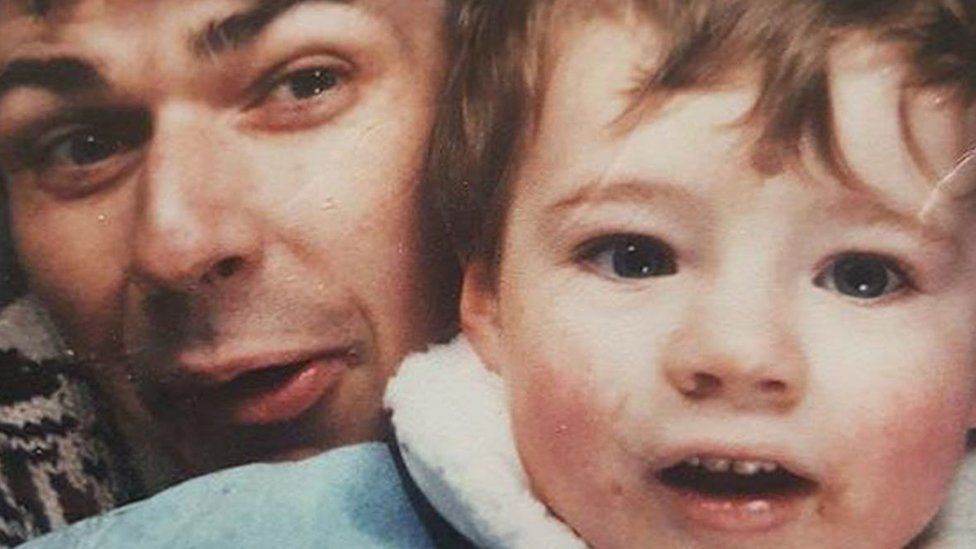
Jason Evans was four when his father, Jonathan, died in 1993
By Vanessa Pearce
BBC News, West Midlands
The government has launched a legal challenge to a ruling over information relating to compensation payments for victims of the infected blood scandal.
Campaign group Factor 8 had called for some details of the scheme to be made public, a move backed by the Information Commissioners Office (ICO).
But the Department of Health and Social Care (DHSC) is fighting against the ruling, by launching an appeal.
The government said it could not comment on ongoing legal proceedings.
More than 3,000 people died after contracting HIV or hepatitis C via NHS treatments in the 1970s and 80s after being treated with contaminated blood.
The ICO's ruling was triggered by Freedom of Information (FOI) requests for email correspondence by Factor 8's founder Jason Evans, whose father died after being treated with contaminated blood.
The DHSC disclosed a small amount of information but withheld the remainder, the ICO said.
Image source, Jason Evans
Image caption,Bereaved relatives have been campaigning for compensation
The ICO ruled on 1 September the government must disclose further information relating to interim compensation payments to victims within 35 days, but added neither the public authority nor the complainant had accurately described the withheld information.
An inquiry is under way to examine how thousands of patients were infected and how authorities, including the government, responded.
'Total silence'
The inquiry's final compensation report, published in April, said the government should set up a compensation system before the final report, now due next March.
It recommended interim payments should be made to all bereaved families, "neither of which have happened," said Mr Evans, who lives in Coventry.
There had been "total silence" from the government on the matter, he said.
"So one of the things I did was make Freedom of Information requests to try and get out of the Department of Health what was going on, and they've basically refused to release most of the information," he said.
"I took it to the Information Commissioner's Office, which said I had a legal right to this information, and they had to provide it.
"And now they've decided to appeal to court to prevent them from having to publish it."
A government spokesperson said the inquiry had heard from victims and their families and would report its findings in the coming months.
Mr Evans was four years old when his dad Jonathan died in 1993, having contracted both HIV and hepatitis C at the Oxford Haemophilia Centre.
High-risk groups
At the time, the medication was imported from the US, where it was made from the pooled blood plasma of thousands of paid donors, including some in high-risk groups, such as prisoners.
He founded the campaign group, and was among those who successfully lobbied the government to set up the public inquiry.
He explained he had been made party to the new legal proceedings.
"On one hand that's helpful, because I can make submissions," he said. "But, on the other hand should we really be having to do this after all this time?'
Image source, PA Media
Image caption,Jason Evans (centre) was among campaigners who delivered a letter to Downing Street
Giving evidence to the inquiry in July, Prime Minister Rishi Sunak said the government would wait for the final report before responding to questions around compensation.
Bereaved families heckled the prime minister when he told the inquiry the government would act as "quickly as possible".
The issue was mentioned in Mr Sunak's written introduction to the King's speech this week, describing it as an "appalling tragedy and dreadful failure," but not in the speech itself, explained Mr Evans.
'Crushed again'
"I think every victim and bereaved family was very disappointed," he said.
"It had been alluded to by government ministers during the inquiry that it would be.
"And so it was just another example of people's expectations being raised and then crushed again."
"It has been acknowledged by all sides that this was wrong and needs to be righted, but we're still being put through a complete lack of transparency and being treated with the respect we had hoped for."
Follow BBC West Midlands on Facebook, Twitter and Instagram. Send your story ideas to: newsonline.westmidlands@bbc.co.uk
Related Internet Links
The BBC is not responsible for the content of external sites.
 (1).png)
 1 year ago
16
1 year ago
16













